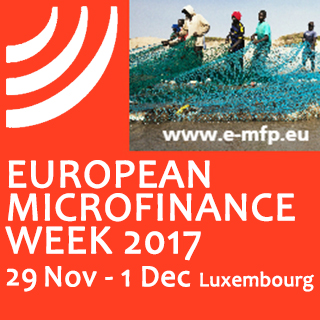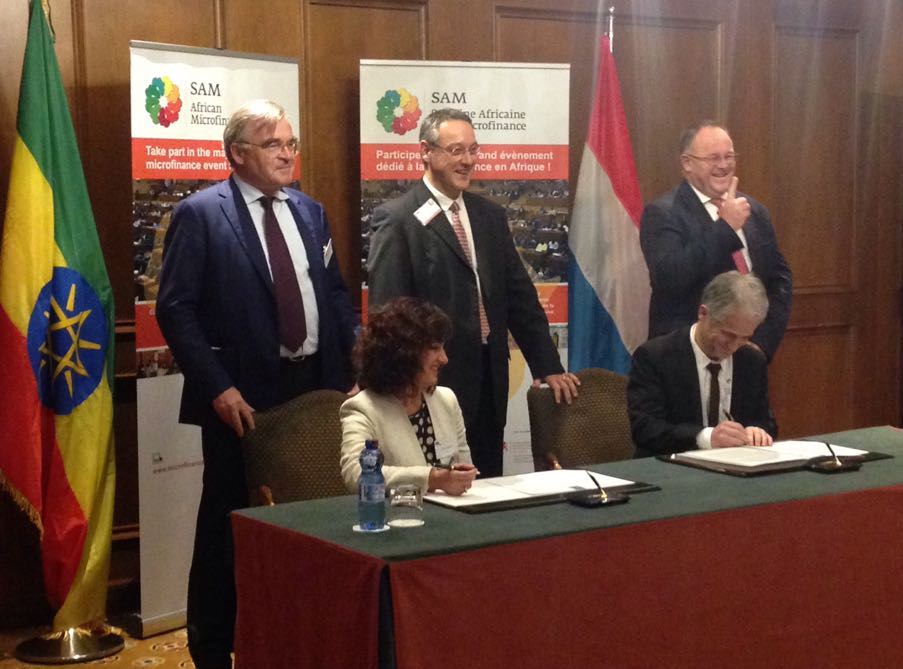The Netherlands Development Finance Company, a government-backed institution also known by its Dutch acronym FMO, and Proparco, a subsidiary of the French government’s Agence Française de Développement (AFD), each recently loaned USD 15 million to Banque Populaire du Rwanda (BPR), a unit of the British Virgin Island’s-based Atlas Mara Group. Proparco served as
Search Results for: measure
SPECIAL REPORT: Clients Come Clean on Sneaking Contraception, Practitioners Move from Serving Women to Empowering Households as European Microfinance Week Closes
During the closing day of European Microfinance Week , Imran Matin of the US-based nonprofit Innovations for Poverty Action (IPA) stressed the importance of not just whether women will use financial services, but “what account ownership will translate into in terms of achievement.” Foreshadowing a theme of the session, he added that “intra-household dynamics is very important and also particularly difficult to measure.”
, Imran Matin of the US-based nonprofit Innovations for Poverty Action (IPA) stressed the importance of not just whether women will use financial services, but “what account ownership will translate into in terms of achievement.” Foreshadowing a theme of the session, he added that “intra-household dynamics is very important and also particularly difficult to measure.”
Bdour Al-Hyari of Jordan’s Microfund for Women (MFW) described a long-running insurance product offered by her microfinance institution (MFI). The coverage provides cash to clients who are hospitalized or have a family member who is. While health issues were a major cause of default in the past, women who got “hospital cash” from MFW reportedly repaid their loans at a rate of
SPECIAL REPORT: Scaling Up Implementation of Social Performance Management at European Microfinance Week
On  the first day of conference sessions at European Microfinance Week, experts in the social performance of microfinance institutions (MFIs) discussed how tools developed over the last ten years have reached a level of maturity warranting their wider rollout.
the first day of conference sessions at European Microfinance Week, experts in the social performance of microfinance institutions (MFIs) discussed how tools developed over the last ten years have reached a level of maturity warranting their wider rollout.
Cecile Lapenu of France-based Cerise described SPI4, the fourth iteration of a set of Social Performance Indicators intended to simplify reporting and provide a common language for different stakeholders to discuss social performance management (SPM). SPI4 incorporates the Smart Campaign’s Client Protection Principles and the Social Performance Task Force’s Universal Standards for SPM. It also includes optional modules on poverty, gender and the environment. To date, 432 SPI4 audits have been completed on institutions in 88 countries.
Jurgen Hammer of the Luxembourg-based Grameen Credit Agricole Foundation explained his organization’s use of the SPI4/ALINUS (Aligning Investors’ Due Diligence to the Universal Standards) framework to evaluate and benchmark the social performance of its partner MFIs. The foundation was meeting or exceeding the benchmark data in all categories except
MICROFINANCE PUBLICATION ROUND-UP: Digital Wallets for Illiterate Customers in India, Agency Banking in Africa, Gender Equality in Financial Services
“Digital Wallet Adoption for the Oral Segment in India: Concept Development for MoWo (Mobile Wallet for Oral);” by Brett Hudson Matthews, Richa Valechha, Vivek Anand, Avantika Kushwaha, Saborni Poddar and Rachit Ohri; published by MicroSave; May 2017; 50 pages, available at:
http://www.microsave.net/files/pdf/DWA_Research_Concept_Development_for_MoWO.pdf
The authors describe a project conducted during 2016 in India on the Mobile Wallet for Oral (MoWo), a mobile-money service designed for the “oral” market segment, which includes 264 million people in the country who have low reading-skill levels. A group of 310 participants from various communities were subjected to “signing, reading and numeracy” tests. Thereafter, 138 people of varying literacy levels participated in focus groups on the user interface of the mobile wallet. Finally, 29 participants performed usability testing.
MICROCAPITAL BRIEF: FMO, Triodos, Accion Invest Equity in Nicaraguan Microfinance Institution Financiera FAMA
Entities of two Dutch institutions, the government-controlled development bank FMO and the foundation-controlled Triodos Bank, recently invested equity in Nicaragua’s Financiera FAMA for the first time. In addition,
SPECIAL REPORT: HR Challenges Within MFIs at European Microfinance Week: “Banking Is People”
MicroCapital: Do you find that microfinance institutions (MFIs) tend to underinvest in human resources (HR)?
Rüdiger Meister: Definitely! Despite the efforts of many consultants in this field, the crucial role of HR management remains under-estimated. Technical assistance interventions, which often accompany investments into MFIs, tend to focus on discrete areas rather than following a holistic and structured approach to capacity building.
There is also a problem of short-term versus long-term thinking. In the short term, the MFI will function even if there are weaknesses in HR management. But in the long term, the MFI will have to pay for mistakes in areas such as
SPECIAL REPORT: ADA, Grameen Credit Agricole Microfinance Foundation Sign Collaboration Agreement at SAM
After Tuesday’s sessions at the  the SAM (Semaine Africaine de la Microfinance) conference, Olivier Massart, the General Manager of ADA, and Eric Campos, Managing Director of the Grameen Credit Agricole Microfinance Foundation (GCAMF), signed an agreement to collaborate on their institutions’ service delivery to microfinance institutions (MFIs). Mr Massart explained that the two Luxembourgish NGOs will work “hand in hand” in areas including the measurement of social impact. ADA specializes in technical assistance, and although GCAMF also provides technical assistance, it is a major local-currency funder of MFIs. Both institutions prioritize working with MFIs that serve people in rural areas as well as women in general.
the SAM (Semaine Africaine de la Microfinance) conference, Olivier Massart, the General Manager of ADA, and Eric Campos, Managing Director of the Grameen Credit Agricole Microfinance Foundation (GCAMF), signed an agreement to collaborate on their institutions’ service delivery to microfinance institutions (MFIs). Mr Massart explained that the two Luxembourgish NGOs will work “hand in hand” in areas including the measurement of social impact. ADA specializes in technical assistance, and although GCAMF also provides technical assistance, it is a major local-currency funder of MFIs. Both institutions prioritize working with MFIs that serve people in rural areas as well as women in general.
Mr Campos told MicroCapital that a primary motivation for the collaboration is to reduce the workload for MFIs, which are often called upon to submit substantial amounts of overlapping data to funders and other interested parties. He also spoke passionately about how MFIs can maintain market share as fintech
SPECIAL REPORT: “Financial Inclusion and Job Creation in Africa” at the SAM Conference in Addis Ababa
Today  at the SAM (Semaine Africaine de la Microfinance) conference, Laura Foschi of ADA addressed the question of “how to support enterprises as they make the transition from micro- to small and medium-sized.”
at the SAM (Semaine Africaine de la Microfinance) conference, Laura Foschi of ADA addressed the question of “how to support enterprises as they make the transition from micro- to small and medium-sized.”
Rebecca Rouse of Innovations for Poverty Action (IPA), described how randomized controlled trials can help determine “how can we best create value, spaces and opportunities for small and medium-sized enterprises (SMEs) and SME growth.” For example, evaluating the effectiveness of a business training program is much more enlightening when
MICROCAPITAL BRIEF: FMO Gives $240k to Sanad Technical Assistance Facility for MSMEs in the Middle East, North Africa
The Sanad Technical Assistance Facility, an affiliate of the Sanad Fund for MSME (Micro-, Small and Medium-sized Enterprises) that supports lenders to
MICROCAPITAL BRIEF: FMO Lending $12.5m to Terabank to Support SMEs in Georgia
The Netherlands Development Finance Company, a government-backed institution also known by its Dutch acronym FMO, recently announced it will loan USD 12.5 million and provide advisory services to Georgia-based joint-stock company (JSC) Terabank.
MICROCAPITAL BRIEF: Netherlands’ FMO Lending $5m to First MicroFinance Bank-Afghanistan to Support MSMEs
The Netherlands Development Finance Company, a government-backed institution also known by its Dutch acronym FMO, recently announced it will loan the local-currency equivalent of USD 5 million to The First MicroFinance Bank-Afghanistan (FMFB-A), which is owned by the Aga Khan Agency for Microfinance (AKAM), a unit of Switzerland-based Aga Khan Development Network (AKDN) that provides microfinance services across ten different countries [1, 6].
MICROCAPITAL BRIEF: Netherlands’ FMO Lending $7.5m to ASA Pakistan for Microloans, Financial Education for 50k Women
The Netherlands Development Finance Company, a government-backed institution also known by its Dutch acronym FMO, recently announced it will loan USD 7.5 million to the Association for Social Advancement (ASA) Pakistan, a microlending unit of Mauritius-based ASA International Holding, “to provide funding and financial education to about 50,000 women and their families.”
MICROCAPITAL BRIEF: Netherlands’ FMO Issues $344k Convertible Loan to Umati Capital Kenya, Fintech Funding Agricultural Value Chain Actors
The Netherlands Development Finance Company, a government-backed institution also known by its Dutch acronym FMO, recently announced it will finance Umati Capital Kenya, a financial technology (fintech) firm, with a convertible facility in local currency equivalent to USD 344,000.
MICROCAPITAL BRIEF: Women’s Financial Inclusion Community of Practice Launches Website
As part of its launch, the Women’s Financial Inclusion Community of Practice (COP) recently released its website, https://www.microfinancegateway.org/organization/womens-financial-inclusion-community-practice, which is intended to facilitate discussions on best practices and solving shared challenges relating to delivering financial services to women with low incomes.
MICROCAPITAL BRIEF: FMO Lending $4m to Babban Gona to Provide Business Services on Credit to Farmers in Nigeria
Nederlandse Financierings-Maatschappij voor Ontwikkelingslanden, a development bank controlled by the Dutch government, recently offered a loan of USD 4 million to Babban Gona, a Nigerian for-profit company that provides business services to small-scale farmers such as assistance with crop insurance; soil analysis; marketing; distribution; and access to seeds, fertilizer and storage facilities.
MICROCAPITAL BRIEF: The Netherlands’ FMO Issues $568m Bond to Finance Green, Financial Inclusion Investments
The Netherlands Development Finance Company, a government-backed institution also known by its Dutch acronym FMO, recently completed a fixed-rate bond issue totaling EUR 500 million (USD 568 million) to fund projects including “climate change mitigation (renewable energy and energy efficiency) and climate change adaptation, as well as inclusive finance projects (microfinance and [small and medium-size enterprise] financing).”
MICROCAPITAL BRIEF: Nigeria’s Access Bank, FMO Launch Female Leadership Programme in Ghana
Access Bank Ghana, an affiliate of Nigeria’s Access Bank Plc, recently partnered with the Netherlands Development Finance Company, a government-backed institution also known by its Dutch acronym FMO, to launch a Female Leadership Programme for entrepreneurs in Ghana.
MICROFINANCE PUBLICATION ROUND-UP: Financial Literacy, Gender Disparity in the Solomon Islands; Savings Groups’ Impact in Ghana, Malawi, Uganda; Financial Inclusion Survey in Vanuatu
“Case Study: SolTuna – Tuna Processing, Solomon Islands;” published by the International Finance Corporation; September 2016; 20 pages; available at:
http://www.ifc.org/wps/wcm/connect/d4561543-cc39-4a9d-9963-26eb5ab4169c/soltuna_updated_May2017.pdf?MOD=AJPERES
This case study investigates the connections between financial literacy and the reduction of absenteeism and other problems at SolTuna, a tuna processing plant in the Solomon Islands.
